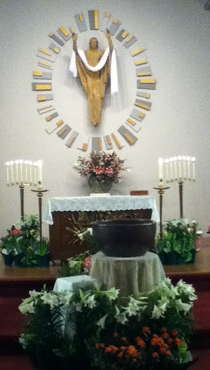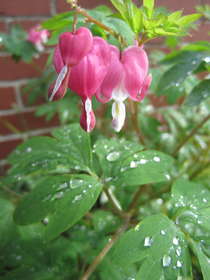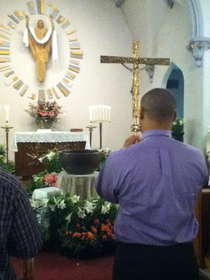PHOTOS: Mary van Balen
“During the Easter season we recall his resurrection and, at Pentecost, the sending of the Spirit. Not only is God-with-Us; God is within us. Liturgically, we celebrate these two seasons at separate times, but we live them as they really are: both present at every moment.”
Mary van Balen
Christmas and Easter? Read my column and find out. 


 PHOTOS: Mary van Balen I have fallen into some bad habits: Eating too much junk food; staying up late; skipping exercise; watching tv; missing prayer time and blog posts. I am not sure what precipitated my “fall.” Splurging on some Easter treats and then not being able to stop? Grocery shopping when I was hungry and buying comfort foods I should have passed by? Weeks of almost incessant rain; Odd work hours?
PHOTOS: Mary van Balen I have fallen into some bad habits: Eating too much junk food; staying up late; skipping exercise; watching tv; missing prayer time and blog posts. I am not sure what precipitated my “fall.” Splurging on some Easter treats and then not being able to stop? Grocery shopping when I was hungry and buying comfort foods I should have passed by? Weeks of almost incessant rain; Odd work hours? When the dough was ready I placed it in an oiled bowl, covered it, placed it on a wooden TV tray by a window in the sun and left to walk to the bank and other errands while the dough raised in the sun and to the strains of La Boheme.
When the dough was ready I placed it in an oiled bowl, covered it, placed it on a wooden TV tray by a window in the sun and left to walk to the bank and other errands while the dough raised in the sun and to the strains of La Boheme.  Easter has come. Spring is here. And, like the robin babies in the nest on my garage, or the goslings I saw in the parking lot by work, I am ready for a new start!
Easter has come. Spring is here. And, like the robin babies in the nest on my garage, or the goslings I saw in the parking lot by work, I am ready for a new start! 
 PHOTOS: Mary van Balen
PHOTOS: Mary van Balen  Some still mourn the deaths of family members. The unemployed face a jobless Monday, again. Some battle cancer. Others care for aging and sick family members. Immigrants wonder if their families will be torn apart or if they will remain together to face an uncertain future. The church was full of suffering, unknowns, and grief. Yet, nothing was stronger than Joy.
Some still mourn the deaths of family members. The unemployed face a jobless Monday, again. Some battle cancer. Others care for aging and sick family members. Immigrants wonder if their families will be torn apart or if they will remain together to face an uncertain future. The church was full of suffering, unknowns, and grief. Yet, nothing was stronger than Joy.
 PHOTO: Mary van Balen For just as from the heavens
PHOTO: Mary van Balen For just as from the heavens 
 PHOTO: Mary van Balen Here is my servant whom I uphold,
PHOTO: Mary van Balen Here is my servant whom I uphold, In today’s online New York Times, columnist David Brooks wrote about
In today’s online New York Times, columnist David Brooks wrote about  NASA How long did Lazarus need before he heard and recognized the command of his God to get up and embrace life once again? Thinking of accounts of those who claim to have had experiences of death and then a return to life, I wonder if Lazarus wanted to come back.
NASA How long did Lazarus need before he heard and recognized the command of his God to get up and embrace life once again? Thinking of accounts of those who claim to have had experiences of death and then a return to life, I wonder if Lazarus wanted to come back. Rev. Bob Graetz, civil rights leader, speaking about civil rights issues of today. PHOTO: Mary van Balen So the guards went to the chief priests and Pharisees, who asked them, Why did you not bring him? The guards answered, Never before has anyone spoken like this man. So the Pharisees answered them, Have you also been deceived? Have any of the authorities or the Pharisees believed in him? But this crowd, which does not know the law, is accursed.” Jn 7,45-49
Rev. Bob Graetz, civil rights leader, speaking about civil rights issues of today. PHOTO: Mary van Balen So the guards went to the chief priests and Pharisees, who asked them, Why did you not bring him? The guards answered, Never before has anyone spoken like this man. So the Pharisees answered them, Have you also been deceived? Have any of the authorities or the Pharisees believed in him? But this crowd, which does not know the law, is accursed.” Jn 7,45-49 In a departure from Lenten reflections, I must address the Federal Budget negotiations. First, cuts to reduce the deficit have been proposed that disproportionately target programs that serve the poor and vulnerable. These programs are not where the big money is found. In the big picture, eliminating them all would do little to reduce federal spending. Many people of many faiths, and some of no particular religious affiliation, are fasting to raise awareness and to pray for responsible decisions regarding the budget.
In a departure from Lenten reflections, I must address the Federal Budget negotiations. First, cuts to reduce the deficit have been proposed that disproportionately target programs that serve the poor and vulnerable. These programs are not where the big money is found. In the big picture, eliminating them all would do little to reduce federal spending. Many people of many faiths, and some of no particular religious affiliation, are fasting to raise awareness and to pray for responsible decisions regarding the budget.